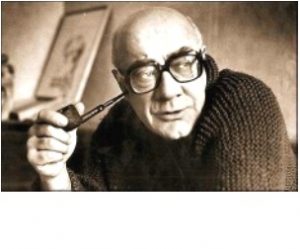Ironically, modern intelligent people do not philosophize a little, although they everywhere demonstrate their erudition and knowledge in the field of philosophy. The way to philosophy they have had alone in a blind wander through the maze of ideas. What they have learned absolutely exactly is that philosophy, what it really is, is not at all what is taught in universities. The image of philosophy as a servant of science or ideology has so deeply ingrained in the consciousness of a person that it can no longer be erased by any fashionable philosophical currents. This image continues to be successfully implemented by the current educational system, impregnated with a positivist spirit, banalities and dogmatism. Clumsy and heavy pirouettes of such a philosophy disgust any normal person. Then, at their own peril and risk, without receiving any help or advice, a modern person begins to build his “philosophical education” alone. Collecting bit by bit philosophical ideas and trying to reflect on them, he, as a rule, learns only what leaves in his memory the most vivid images. Philosophy becomes a means of self-admiration. Instead of exposing illusions, such a homegrown “philosopher” only multiplies them.
An intelligent person can have this or that philosophy (world view), but he does not know how to use it, does not practice it, does not philosophize. Philosophy is the fulfillment of thought, its completion. If only a thesis is proclaimed, not supported by any argument, or if there is no logical connection between the thesis and the argument, the thought remains unfinished.  Actually, there is no thought; there is only “likeness of thought”(by philosopher Merab Mamardashvili). Philosophy, not backed up and not carried out by philosophizing, is simply a set of dogmas, slogans and labels. By and large, the philosophy is a philosophizing. The most important thing in philosophy is the process of executing thoughts. The inclusion of a person in this process, his complete immersion in him, all this gives an increase in meaning. Reading a philosophical book, a person “starts” this process in himself, he becomes a participant in the dialogue, he argues each author’s thesis with examples from his personal life experience, so this or that philosophical idea seems to him so significant.
Actually, there is no thought; there is only “likeness of thought”(by philosopher Merab Mamardashvili). Philosophy, not backed up and not carried out by philosophizing, is simply a set of dogmas, slogans and labels. By and large, the philosophy is a philosophizing. The most important thing in philosophy is the process of executing thoughts. The inclusion of a person in this process, his complete immersion in him, all this gives an increase in meaning. Reading a philosophical book, a person “starts” this process in himself, he becomes a participant in the dialogue, he argues each author’s thesis with examples from his personal life experience, so this or that philosophical idea seems to him so significant.
But the book was read. How to use that unique knowledge that a person has discovered with it help? How do I communicate this to another person without losing the full meaning? We need a certain community, a “college” of thinking people who would practice philosophy and practice a philosophizing. It can be something like a philosophical club, a philosophical cafe, a philosophical house. The main thing is that these communities should be built not according to the principle of scientific, educational or medical institutions. The principle of their activity should be set not by the norm of a social institution, but by personal interest, initiative and self-determination of each participant in this community. The main condition – expressed thoughts should be reasoned and completed, and they should be heard and discussed.